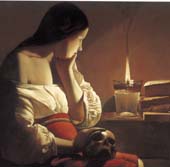word among us
Belonging
Notes from Luigi Giussani’s address to the adults of Communion and Liberation of the Diocese of Milan on Beginning Day Milan, September 23, 2000
In a Sunday oration–which makes prayer and the use of time even more meditational–I read this thought: “O God, who reveal your omnipotence principally through mercy and pardon, continue to rain down on us your grace, so that by walking toward the gifts You have promised we may participate in eternal happiness.” (Sunday Oration, Week 26)
Just as Mystery became incarnate in a man, Jesus of Nazareth, so this eternal happiness defies the passage of time and this Mystery remains the face of our earth. For this reason, St. Paul wrote to the early Christians in Galatia: “The life I now live in the flesh I live by faith in the Son of God, who loved me and gave Himself for me.” (Gal 2:20) Our commitment, then, is not to this or that thing, but to life itself, life as such, in accordance with all the factors that make it up, all its needs and demands.
“The life I now live in the flesh I live by faith in the Son of God, who loved me and gave Himself for me.” There is no break, no interruption between us, our life, the “I” and its life; there is no break, but the fact of Jesus is the most overwhelming fact that the entire universe could ever have known.
St. Paul explains this to the early Christians in Rome: “For none of us lives for himself and none of us dies for himself; while we are alive, we are living for the Lord, and when we die, we die for the Lord: and so, alive or dead, we belong to the Lord.” (Rom 14:7-9)
Thus God’s Mystery, the Lord Jesus Christ, has chosen a people from among all the peoples of the earth to be his Chosen People, chosen so that it could become his messenger, his envoy in history, for all time and all space, for all the time of history and all the space of the world, so that it could glorify Him, that is, in the last analysis–as we said in the course of a Fraternity Retreat a few years ago–so that everything would be to God’s glory, recognizing that God is all in all (God is all in all!).
The Lord, the redeemer of Israel, says in a passage from Isaiah:
“Thus says Yahweh, your redeemer,
the Holy One of Israel:
I am Yahweh your God
and teach you for your own good,
I lead you in the way you ought to go.
If only you had listened to my commandments!
Your prosperity would have been like a river
And your saving justice like the waves of the sea.
Your descendants would have been numbered like the sand,
your offspring as many as its grains.” (Is 48:17-19)
In order to walk with God, his people has to know how to be obedient, and thus faithful to Him in every circumstance of its life, because it has Christ.
The word that defines the Mystery of God in Jesus is “Mercy.” Because of this, God gives us time so that his grace can bear fruit in human freedom.
“Eternal is His mercy.”
Thus also our human transgressions sink all their precarious consistency in the sea of God, in the sea of the Lord. For this reason, the most beautiful word for defining Mystery–what to human beings is the unknown–is “mercy.”
Mercy is true imitation of Christ, and this is the special aspect, but heartrending in its force of persuasion, by which God justifies Himself, by which Mystery reveals Himself, by which the companionship of Jesus moves forward in us, penetrates us even deeply.
Mercy as true imitation of Jesus is the gaze of the Mystery on any man, it is the echo of God’s charity in us. Mercy is this labor, the labor of freedom. Accepting God’s mercy toward us means acknowledging the shining victory that mercy is over all the limits we find in others.
I pray to the Blessed Virgin and I hope, hope for you and for me, that in each of us this new year will ripen our faith–the faith–and the truth of these words. May the Virgin obtain this miracle for me, too. All this would mean multiplying the great miracle of well-being for all of us as well as for all our people, to the advantage also of the life of the world, as the prophet Isaiah confirms in the text cited above.
It is not a program; it is an input, a surge of will, of our good will, of our freedom, that–as we have seen and meditated upon in the Fraternity Retreat of 1997, which is the most deeply thought-out thing I have ever done–is, in a word, an intensity of life, an intensity of certainty, and so an intensity of hope. The word “hope” is the most difficult one for human beings.
The present can be a powerful victory or a deceptive one, but the word “mercy” arrives like an ocean wave on the shore, like a shoreline that is serene and full of the freshness of Being.
May this word, then, be the outcome of all the attention that we pay to each other. May the Lord illumine and sustain us, making us hope even beyond our limits, that is, beyond the limits that we have within us.
As it ages, our human machine begins to show the evidence of all it has been through, and in its labors shows all its limitations. But every limitation is overcome, can be overcome, by a hope that is well-founded, fully and adequately well-founded.
Our faith is the locus where these reasons exist, it generates the content of these reasons, and hope is the deep tranquillity of the heart every day.
My wish is that the Virgin may help you willingly and joyfully, and that she may put her joy in your hearts, that she may aid this will of ours, this desire of ours. May whatever God has wanted come about in all of us and sustain us in every moment of sadness and in every seeming inability.
I wish this for you and for me. But the most beautiful thing to be said is that we must be merciful, must have mercy toward each other. If God, the Christian God, is put before all the sins of the world, it would be obvious to say, “May God destroy the world that is like this!” Instead, God dies for a world like this one, He becomes man and dies for mankind, so much so that this mercy represents the ultimate meaning of the Mystery. The word that best expresses Mystery, expresses it most concretely, most existentially, is the word “mercy.”
And the Spirit of God, the Spirit of Christ, the creator–Veni Creator Spiritus–creator of everything (of everything!), reaches a level inconceivable to man: it recreates. May this happen, it must happen every day of our lives during this year. May we be able to ask every evening, “What was reborn in me today? What was recreated in me today?” One can say this before the Lord, even if one has people around him who could accuse him in an apparently true and just way. But justice is our place, the place that we take before the Mystery; justice is the place that we take next to Christ, between us and Christ, between us and Jesus.
I wish to thank both Cesana and Father Pino very warmly for their testimonies. The way in which they have spoken is a great witness for me and thus for all of you.
So then, let’s make a date with each other for every day of this year (but especially when we gather together), and may we in simple truth give the right example and establish together the Spirit of Jesus that penetrates our hearts and demonstrates, demonstrates to us that no verbal limit can destroy that relationship with Jesus in which the relationship with the Eternal is embodied.
This I wish, to you, and also to me. Pray to the Blessed Virgin for this.
Georges de La Tour (1593-1652) is one of the most important and mysterious painters in seventeenth century European art. He gave a very personal interpretation to the revolutionary handling of light introduced by Caravaggio, who was born about twenty years earlier. La Tour was a highly meditative artist, and left behind him very few works, in which he often returned to the same key subjects. Among these is certainly the Repentant Mary Magdalene, with which, starting from the celebrated model by the young Caravaggio now in the Galleria Doria Pamphilj in Rome, he investigates in the silence of a bare interior illuminated by the emblematic light of a candle the theme of yielding to Christ’s mercy. The three Magdalenes reproduced on these pages are now, respectively, in the Los Angeles Museum, the National Gallery in Washington, and the Metropolitan in New York.


